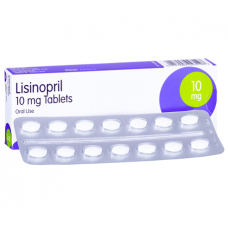Lisinopril Tablet
- In Stock
Available Options
| Quantity | Price | Unit Price | |
|---|---|---|---|
| 20mg x 50 tablets | $70.00 | $1.40 | |
| 20mg x 100 tablets | $130.00 | $1.30 | |
| 20mg x 200 tablets | $240.00 | $1.20 | |
| 20mg x 300 tablets | $300.00 | $1.00 | |
| 20mg x 400 tablets | $360.00 | $0.90 | |
| 20mg x 500 tablets | $400.00 | $0.80 | |
| 20mg x 700 tablets | $525.00 | $0.75 | |
| 20mg x 1000 tablets | $560.00 | $0.56 |
| Quantity | Price | Unit Price | |
|---|---|---|---|
| 40mg x 50 tablets | $75.00 | $1.50 | |
| 40mg x 100 tablets | $140.00 | $1.40 | |
| 40mg x 200 tablets | $260.00 | $1.30 | |
| 40mg x 300 tablets | $360.00 | $1.20 | |
| 40mg x 400 tablets | $400.00 | $1.00 | |
| 40mg x 500 tablets | $450.00 | $0.90 | |
| 40mg x 700 tablets | $560.00 | $0.80 | |
| 40mg x 1000 tablets | $600.00 | $0.60 |
Lisinopril tablets are a widely prescribed medication with a critical role in managing high blood pressure (hypertension) and various heart-related conditions. As an angiotensin-converting enzyme (ACE) inhibitor, Lisinopril works by relaxing blood vessels, reducing blood pressure, and improving the efficiency of the heart.
Common Uses:
-
Hypertension (High Blood Pressure): Lisinopril tablets are primarily prescribed to individuals with hypertension. By inhibiting the production of angiotensin II, a hormone that narrows blood vessels, Lisinopril helps blood vessels relax, leading to lowered blood pressure. This can reduce the risk of heart attacks, strokes, and other cardiovascular complications associated with high blood pressure.
-
Heart Failure: Lisinopril is often used in the treatment of heart failure to improve the heart's pumping ability and reduce the strain on the heart.
-
Post-Myocardial Infarction (Heart Attack): It may also be prescribed to patients who have recently experienced a heart attack to improve their cardiac function and reduce the risk of future cardiovascular events.
Dosage and Administration:
The specific dosage of Lisinopril tablets prescribed by healthcare professionals can vary depending on the patient's condition and medical history. Typically, it is taken orally once daily, with or without food. The dosage and treatment plan should be closely monitored and adjusted as needed by your healthcare provider.
Precautions and Considerations:
- Inform your healthcare provider about any existing medical conditions, allergies, or medications you are taking before starting Lisinopril treatment.
- It is essential to follow a heart-healthy lifestyle, including a balanced diet low in sodium and regular exercise, alongside Lisinopril to achieve optimal blood pressure control and cardiovascular health.
- Regular monitoring of blood pressure and kidney function is crucial to assess the medication's effectiveness and safety.
- Lisinopril may interact with certain medications or medical conditions, so it is important to discuss potential interactions with your healthcare provider.
Potential Side Effects:
While Lisinopril is generally well-tolerated, some individuals may experience side effects. Common side effects may include cough, dizziness, and changes in kidney function. Serious side effects are rare but can include severe allergic reactions or changes in blood potassium levels.
Conclusion:
Lisinopril tablets play a vital role in managing high blood pressure and various heart-related conditions. By relaxing blood vessels and reducing blood pressure, Lisinopril helps lower the risk of cardiovascular complications and improve overall heart health. Patients should closely follow their healthcare provider's guidance to ensure the safe and effective use of this medication, and maintaining a heart-healthy lifestyle is crucial for achieving optimal results in blood pressure control and cardiovascular wellness. Regular monitoring of blood pressure and kidney function is essential for tracking progress and making necessary adjustments to the treatment plan.
Tags: Lisinopril Tablet

